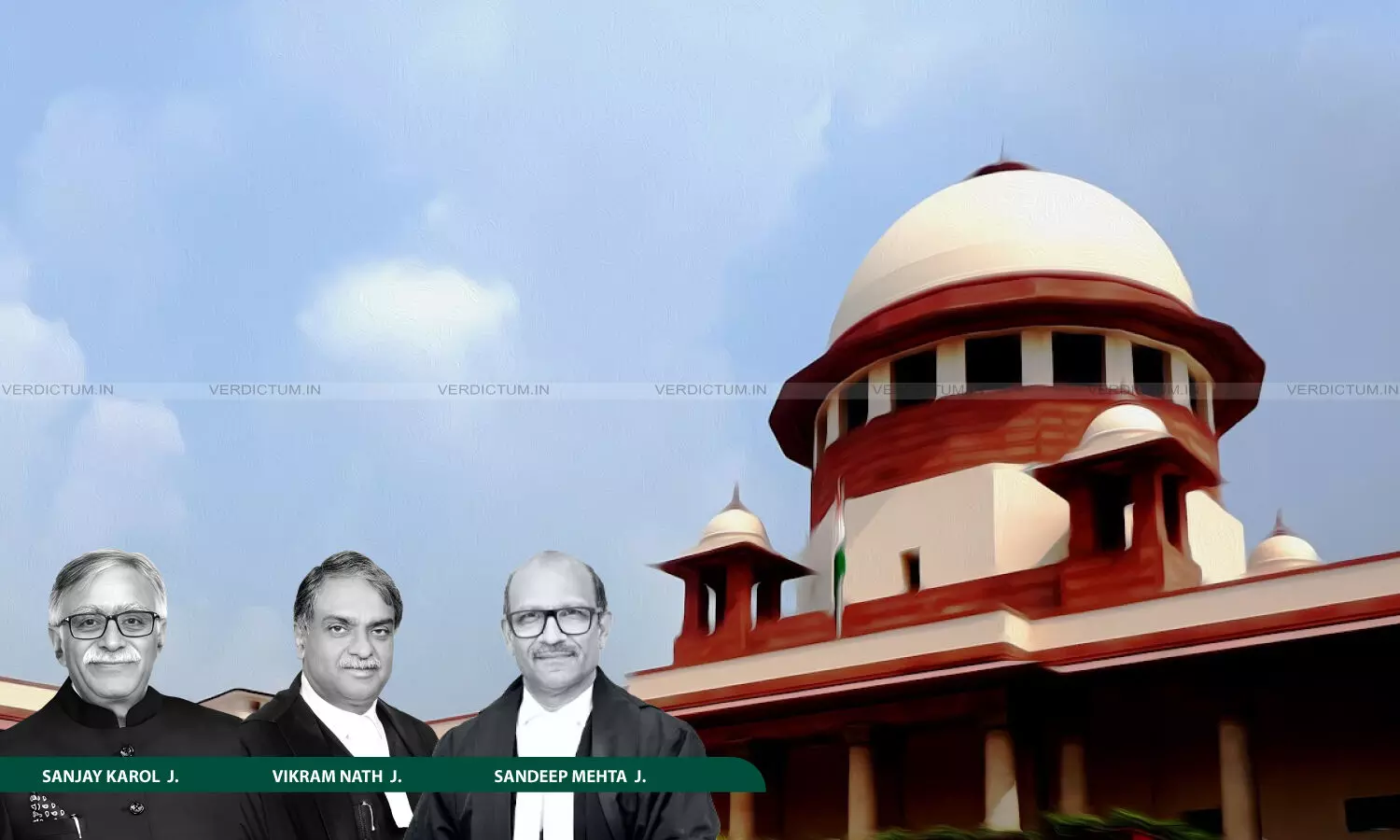
Justice Vikram Nath, Justice Sanjay Karol, Justice Sandeep Mehta, Supreme Court
Supreme Court Asks High Court To First Deal With Issue Raised By Bank On First Charge & Priority Over EPFO Under Provident Fund Act
 |
|The Appeal before the Supreme Court was filed against the judgment dismissing the writ petition filed by the appellant and directing that the amount deposited be transmitted to the account of the PF Commissioner.
While considering a matter relating to the Employees Provident Fund and Miscellaneous Provisions Act, 1952, the Supreme Court has asked the Karnataka High Court to first deal with issues raised by the Bank on first charge and priority over and above EPFO to satisfy its dues from the secured property in view of Section 35 of SARFAESI Act.
The Appeal before the Supreme Court was filed against the judgment of the Karnataka High Court dismissing the writ petition filed by the appellant and directing that the amount deposited be transmitted to the account of the respondent.
The 3-Judge Bench of Justice Vikram Nath, Justice Sanjay Karol and Justice Sandeep Mehta held, “In our considered opinion, it would be appropriate that the High Court first deals with the issues raised by Axis Bank that it has first charge and priority over and above the EPFO to satisfy its dues from the secured property in view of Section 35 of the SARFAESI Act. The High Court will examine the priority of first charge amongst the EPFO and the secured creditors i.e. the Axis Bank and other two Banks, namely, State Bank of India and the State Bank of Travancore (now taken over by SBI) in view of Section 11(2) of the PF Act.”
AOR Shivendra Singh represented the Appellant while AOR Dushyant Parashar represented the Respondent.
Factual Background
An establishment by the name of M/s Acropetal Technologies Pvt. Ltd. was covered under the ambit of Employees Provident Fund and Miscellaneous Provisions Act, 1952. The Establishment defaulted in payment of provident fund dues since July, 2013 and accordingly an enquiry was initiated under Section 7(A) of the PF Act. The Regional Provident Fund Commissioner-II, determined a liability of Rs.1,28,90,486 against the Establishment and accordingly directed it to deposit the same within 15 days. The Establishment informed that all its bank loan accounts with the Bank had been declared NPA (Non-Performing Asset) and that the Banks had initiated a recovery process by auctioning their property.
The Bank had requested the Employees’ Provident Fund Organisation to communicate to the Axis Bank Ltd. for making payment directly to them towards the dues. The Axis Bank sold the property in auction and appropriated the sale proceeds against its outstanding dues and informed the EPFO that the Bank had no amount in the account of the Establishment as it still had outstanding dues against the Establishment. The EPFO, in the meantime, was informed by the Establishment that another property was being auctioned by State Bank of India through its assignee, the appellant-EARC.
The EPFO communicated with EARC and the State Bank of India to remit the outstanding dues. The EPFO demanded an amount of Rs 2,08,94,800 from EARC as per priority under Section 11(2) of the PF Act. EARC filed a writ petition before the Karnataka High Court, in which an interim order was granted staying the operation of order raising demand for an amount of Rs 1,30,52,221.The EPFO demanded EARC to remit the balance amount of Rs 78,42,579 and also issued an order of attachment. EARC challenged the order of attachment and also the recovery certificate. The High Court directed the EARC to deposit Rs75 lakh as an interim measure and subject to such deposit, stayed further recovery. By the impugned order, the writ petition of the EARC was dismissed with the further direction that the amount of Rs 75 lakh deposited by EARC be transmitted to the account of EPFO. Aggrieved by the same, EARC preferred the appeal before the Apex Court.
Reasoning
The Bench took note of the admitted position that Axis Bank, by sale of Attibele property, had realised an amount of Rs 12 crore approximately, whereas the appellant, by THE sale of the other two properties, namely Kammanahalli property and Palya property, had realised only Rs 7 crore approximately. It was also an admitted position that the appellant had already paid Rs 75 lakh and had given an undertaking that it would pay Rs 78,42,579 in full and final discharge of its liability.
The Bench also took note of the appellant’s case that the balance payment of Rs 1,30,52,221 approximately could be recovered from the Axis Bank.
“In our considered opinion, it would be appropriate that the High Court first deals with the issues raised by Axis Bank that it has first charge and priority over and above the EPFO to satisfy its dues from the secured property in view of Section 35 of the SARFAESI Act. The High Court will examine the priority of first charge amongst the EPFO and the secured creditors i.e. the Axis Bank and other two Banks, namely, State Bank of India and the State Bank of Travancore (now taken over by SBI) in view of Section 11(2) of the PF Act”, it said.
Thus, setting aside the impugned order, the Bench restored the Writ Petition to be decided afresh after impleading the Axis Bank as a respondent and after affording due opportunity of exchanging pleadings and hearing to all the parties to the said proceedings. Allowing the appeal, the Bench ordered, “The High Court will take into consideration, the relevant fact relating to the charge having been created by the EPFO over the properties to be auctioned by the Axis Bank prior to the auction.”
Cause Title: M/s Edelweiss Asset Reconstruction Limited v. Regional Pf Commissioner II And Recovery Officer, RO Bengaluru (Koramangala) (Neutral Citation: 2025 INSC 1045)
Appearance
Appellant: AOR Shivendra Singh
Respondent: AOR Dushyant Parashar, Advocates Manu Parashar, Dinesh Pandey, AOR M/S. Dua Associates, Advocate Jaskaran Singh Bhatia